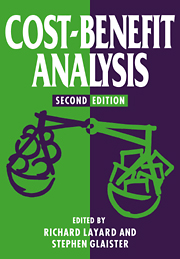Book contents
- Frontmatter
- Contents
- Introduction
- PART I THEORETICAL ISSUES
- PART II HOW TO VALUE THINGS
- 7 Time savings: Research into the value of time
- 8 Safety and the saving of life: The theory of equalizing differences
- 9 Safety and the saving of life: The economics of safety and physical risk
- 10 The environment: The environment and emerging development issues
- 11 Exhaustible resources: Resource depletion, research and development and the social rate of discount
- PART III CASE STUDIES
- Index
8 - Safety and the saving of life: The theory of equalizing differences
Published online by Cambridge University Press: 24 November 2009
- Frontmatter
- Contents
- Introduction
- PART I THEORETICAL ISSUES
- PART II HOW TO VALUE THINGS
- 7 Time savings: Research into the value of time
- 8 Safety and the saving of life: The theory of equalizing differences
- 9 Safety and the saving of life: The economics of safety and physical risk
- 10 The environment: The environment and emerging development issues
- 11 Exhaustible resources: Resource depletion, research and development and the social rate of discount
- PART III CASE STUDIES
- Index
Summary
INTRODUCTION
The theory of equalizing differences refers to observed wage differentials required to equalize the total monetary and non-monetary advantages or disadvantages among work activities and among workers themselves. The basic idea originates in the first ten chapters of Book I of The Wealth of Nations, which is unsurpassed for the depth and breadth of analysis as well as for clarity of exposition. It remains the fundamental reference work on the subject. The topic is important for both theoretical and empirical reasons. On the conceptual level it can make legitimate claim to be the fundamental (long-run) market equilibrium construct in labour economics. Its empirical importance lies in contributing useful understanding to the determinants of the structure of wages in the economy and for making inferences about preferences and technology from observed wage data.
As a framework of analysis, equalizing or compensating wage differentials has found its most widespread use as a theory of supply of workers to labour activities that are differentiated by various attributes – working environments, worker skills and other job requirements. In one important class of problems these attributes refer to non-pecuniary, consumption by-products of work. Activities that offer favourable working conditions attract labour at lower than average wages, whereas jobs offering unfavourable working conditions must pay premiums as offsetting compensation in order to attract workers.
Information
- Type
- Chapter
- Information
- Cost-Benefit Analysis , pp. 272 - 289Publisher: Cambridge University PressPrint publication year: 1994
Accessibility standard: Unknown
- 1
- Cited by
